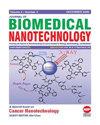miR-429 脂质体纳米粒子通过靶向肺癌小鼠的 Hippo/YAP 抑制肺癌
IF 2.9
4区 医学
Q1 Medicine
引用次数: 0
摘要
肺癌发病率的不断上升,严重威胁着人类生命财产安全。目前,临床治疗中相关药物难以准确识别和作用于癌细胞。因此,利用纳米脂质体携带相关药物和基因进行靶向治疗具有重要意义。Hippo/YAP信号通路与癌细胞的增殖和凋亡有关。因此,本研究通过构建miR-429脂质体纳米颗粒进一步分析其抑制肺癌细胞的机制。制备并表征miR-429脂质体纳米颗粒,造模成功后注射实验组小鼠,分为模型组、miR-429脂质体纳米颗粒组、Hippo/YAP抑制剂(TDI-011536)组、Hippo/YAP激活剂(XMU-MP-1)组。取肺癌细胞构建miR-429基因沉默组和miR-429基因过表达组,分析细胞增殖及miR-429、Hippo、YAP水平。miR-429脂质体纳米颗粒促进肺癌的发生发展。miR-429对Hippo/YAP信号传导有一定的抑制作用,降低Hippo/YAP信号传导活性,抑制肺癌细胞的生长。miR-429脂质体纳米颗粒可以抑制Hippo/YAP信号,降低其表达,从而抑制肺癌细胞生长,诱导凋亡,因此miR-429脂质体纳米颗粒可能用于治疗肺癌。本文章由计算机程序翻译,如有差异,请以英文原文为准。
miR-429 Liposome Nanoparticles Inhibit Lung Cancer via Targeting of Hippo/YAP in Lung Cancer Mice
The increasing incidence of lung cancer seriously threatens the safety of human life and property. At present, it is difficult for relevant drugs in clinical treatment to accurately identify and act on cancer cells. Therefore, liposome nanoparticles are used to carry related drugs and
genes for targeted therapy, which is of great significance. Hippo/YAP signaling is related to the proliferation and apoptosis of cancer cells. Therefore, in this study, the mechanism of lung cancer cells inhibition was further analyzed by constructing miR-429 liposome nanoparticles. miR-429
liposome nanoparticles were prepared and characterized and then injected into experimental group mice after successful modeling and divided into model group, miR-429 lipid nanoparticle group, Hippo/YAP inhibitor (TDI-011536) group, and Hippo/YAP activator (XMU-MP-1) group. Lung cancer cells
were taken to construct miR-429 gene silencing and miR-429 gene overexpression groups, followed by analysis of cell proliferation and levels of miR-429, Hippo and YAP. The miR-429 liposome nanoparticles promote the occurrence and development of lung cancer. The miR-429 has a certain inhibitory
effect on Hippo/YAP signaling, where it reduces Hippo/YAP signaling activity and inhibits the growth of lung cancer cells. The miR-429 liposome nanoparticles can inhibit Hippo/YAP signaling, reduce their expression, thereby inhibiting lung cancer cell growth and inducing apoptosis, so miR-429
liposome nanoparticles might be used in treating lung cancer.
求助全文
通过发布文献求助,成功后即可免费获取论文全文。
去求助
来源期刊
CiteScore
4.30
自引率
17.20%
发文量
145
审稿时长
2.3 months
期刊介绍:
Information not localized

 求助内容:
求助内容: 应助结果提醒方式:
应助结果提醒方式:


